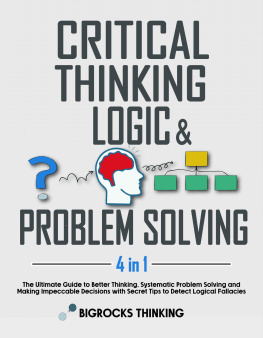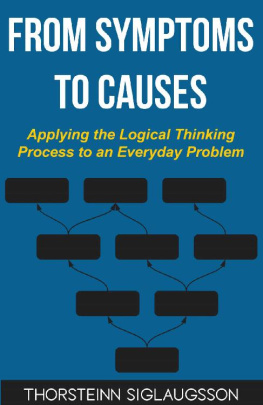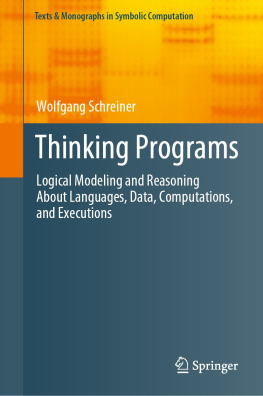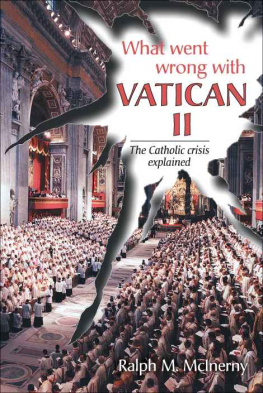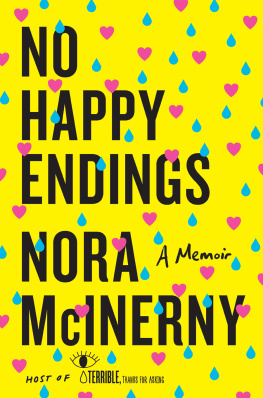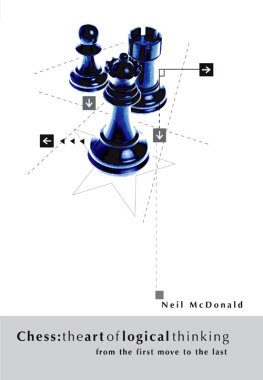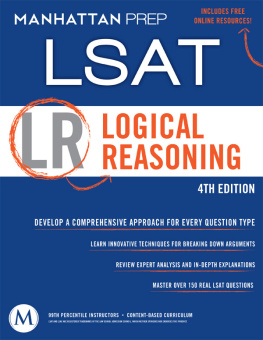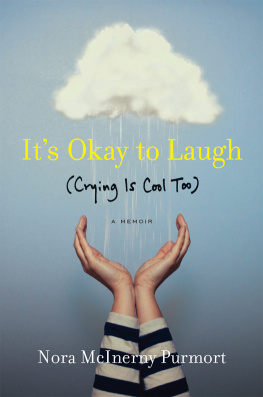D. Q. McInerny - Being Logical: A Guide to Good Thinking
Here you can read online D. Q. McInerny - Being Logical: A Guide to Good Thinking full text of the book (entire story) in english for free. Download pdf and epub, get meaning, cover and reviews about this ebook. year: 2004, publisher: Random House, genre: Religion. Description of the work, (preface) as well as reviews are available. Best literature library LitArk.com created for fans of good reading and offers a wide selection of genres:
Romance novel
Science fiction
Adventure
Detective
Science
History
Home and family
Prose
Art
Politics
Computer
Non-fiction
Religion
Business
Children
Humor
Choose a favorite category and find really read worthwhile books. Enjoy immersion in the world of imagination, feel the emotions of the characters or learn something new for yourself, make an fascinating discovery.

- Book:Being Logical: A Guide to Good Thinking
- Author:
- Publisher:Random House
- Genre:
- Year:2004
- Rating:3 / 5
- Favourites:Add to favourites
- Your mark:
- 60
- 1
- 2
- 3
- 4
- 5
Being Logical: A Guide to Good Thinking: summary, description and annotation
We offer to read an annotation, description, summary or preface (depends on what the author of the book "Being Logical: A Guide to Good Thinking" wrote himself). If you haven't found the necessary information about the book — write in the comments, we will try to find it.
Being Logical: A Guide to Good Thinking — read online for free the complete book (whole text) full work
Below is the text of the book, divided by pages. System saving the place of the last page read, allows you to conveniently read the book "Being Logical: A Guide to Good Thinking" online for free, without having to search again every time where you left off. Put a bookmark, and you can go to the page where you finished reading at any time.
Font size:
Interval:
Bookmark:
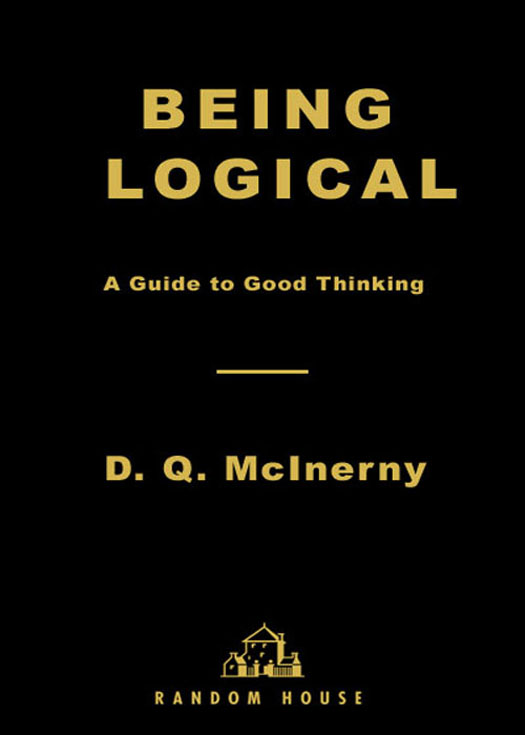
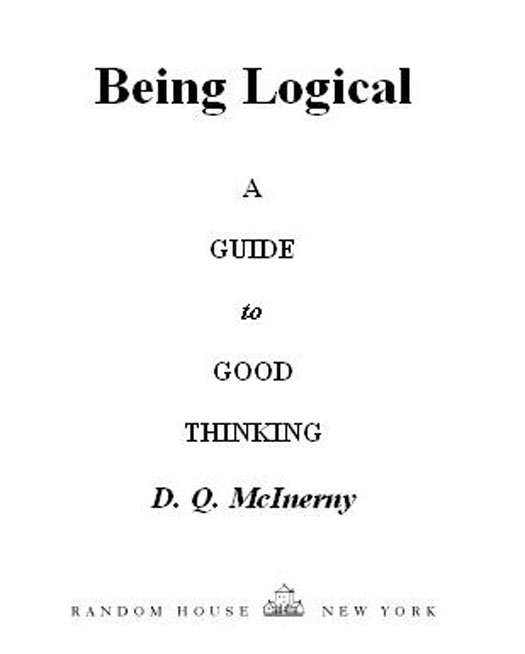
Contents
IN MEMORIAM
AUSTIN CLIFFORD MCINERNY
and
VIVIAN GERTRUDE RUSH MCINERNY
We may take Fancy for a companion,
but must follow Reason as our guide.
DR. SAMUEL JOHNSON
Preface
LOGIC IS ABOUT clear and effective thinking. It is a science and an art. This book is intended to introduce readers to the rudiments of the science as well as to the basic skills associated with the art.
We all know people who are very bright but who do not always shine when it comes to being logical. They have the ability to think logicallythat is, clearly and effectivelybut that ability does not habitually manifest itself. The likelihood is that it has never been properly developed, pointing to a deficiency in their education. Indeed, logic is the very backbone of a true education, and yet it is seldom taught as such in American schools. To my mind, logic is the missing piece of the American educational system, the subject that informs every other subject from English to history to science and math.
Some readers, especially if this book represents their first serious encounter with logic, might react skittishly to what appears to be an overly technical vocabulary, or to the symbolic notation that logic makes frequent use of. Dont be scared off by initial impressions. I have made a concerted effort to present whatever technical matters I deal with here (which in any event are not all that trying) in as simple and uncomplicated a way as possible. At the same time, however, I have tried to avoid lapsing into the simplistic. A dumbed-down logic is not logic at all. Other readers might be put off by what they perceive to be an emphasis upon the obvious. I do, in fact, place a good deal of stress on the obvious in this book, and that is quite deliberate. In logic, as in life, it is the obvious that most often bears emphasizing, because it so easily escapes our notice. If I have belabored certain points, and regularly opted for the explicit over the implicit, it is because I adhere to the time-honored pedagogic principle that it is always safest to assume as little as possible.
Logic, taken as a whole, is a wide, deep, and wonderfully varied field, and I would be pleased if my readers, as a result of their encounter with this little book, were moved to become more familiar with it. However, my aim here is very modest. This is neither a treatise in logical theory nor a textbook in logicthough I would not be disappointed to learn that it proves useful in the classroom. My governing purpose was to write a practical guidebook, presenting the basic principles of logic in a way that is accessible to those who are encountering the subject for the first time. Being Logical seeks to produce practitioners, not theoreticianspeople for whom knowing the principles of logic is in the service of being logical.
In the hope of better serving the practical ends of the book, I have adopted a somewhat informal style, often addressing the reader directly, and, in the manner of a tutor or coach, sometimes assuming a distinctively directive tone. I treat logic in five stages, represented by the five parts of the book, each successive stage building upon the one that preceded it. Part One is preparatory, and deals with the proper frame of mind that must be established if logical thinking is to take place at all. In Parts Two and Three, the heart of the book, we pass into the realm of logic proper. Part Two explains the foundational truths that govern logical thinking, while Part Three focuses on argumentthe public expression of logical thinking. In Part Four, I discuss attitudes and frames of mind that promote illogical thinking. Finally, Part Five concentrates on the particulars of illogical thinkingthe fallacies.
A final word, of admiration and appreciation, for a sparkling little book called The Elements of Style, by William Strunk, Jr., and E. B. White, which was the inspiration for Being Logical. What I have managed to accomplish here is no match for the unique achievement of Strunk and White, but I hope that Being Logical might to some degree succeed in doing for the cause of good thinking what The Elements of Style has done for that of good writing. My earnest wish is that this book may succeed in convincing its readers of the intrinsic importance of logicand that it engender in them an appreciation for the priceless satisfaction which inevitably accompanies the happy state of being logical.
PART ONE
Preparing the Mind for Logic
B eing logical presupposes our having a sensitivity to language and a knack for its effective use, for logic and language are inseparable. It also presupposes our having a healthy respect for the firm factualness of the world in which we live, for logic is about reality. Finally, being logical presupposes a lively awareness of how the facts that are our ideas relate to the facts that are the objects in the world, for logic is about truth. In this first part of the book I will discuss those attitudes, points of view, and practical procedures whose adoption prepares the mind for a successful engagement with logic.
1. Be Attentive
Many mistakes in reasoning are explained by the fact that we are not paying sufficient attention to the situation in which we find ourselves. This is especially true in familiar situations. That very familiarity causes us to make careless judgments about facts right before our eyes. We misread a situation because we are skimming it, when what we should be doing is perusing it. Often, we assume that a familiar situation will be but a repeat performance of a similar situation weve experienced before. But, in the strictest sense, there are no repeat performances. Every situation is unique, and we must be alert to its uniqueness.
The phrase to pay attention is telling. It reminds us that attention costs something. Attention demands an active, energetic response to every situation, to the persons, places, and things that make up the situation. It is impossible to be truly attentive and passive at the same time. Dont just look, see. Dont just hear, listen. Train yourself to focus on details. The little things are not to be ignored, for it is just the little things that lead us to the big things.
2. Get the Facts Straight
A fact is something made or done. It has clear objective status. It is something we respond to as having an independent status all its own. It is naggingly persistent, demands recognition, and can be nasty if ignored.
There are two basic types of objective facts, things and events. A thing is an actually existing entity, animal, vegetable, or mineral. The White House is an example of the first type of fact, and the assassination of Abraham Lincoln of the second. The first type is more basic than the second because events are made up of things or of the actions of things. A state dinner is to be held at the White House. Such an event could not take place were it not for the existence, first and foremost, of the fact that is the White House, and countless other facts as well. In order to establish the factualness of an event, any number of concrete things need to be appealed to.
To determine the reality of a fact that is a thing, all you need do is pay it a visit. If it actually exists it must be somewhere, and, assuming its place to be accessible to you, you can verify its factualness by direct observation. Take the case of the White House. To ascertain its being a fact, rather than purely imaginary, you can travel to Washington, D.C., and there see the White House with your own eyes. That is the most direct and reliable way to establish its factualness. But you could also rely on indirect evidence: For example, by taking the word of a trustworthy eyewitness that the White House is indeed in Washington, D.C. Or you could decide that photographic evidence is sufficient to establish factualness.
Next pageFont size:
Interval:
Bookmark:
Similar books «Being Logical: A Guide to Good Thinking»
Look at similar books to Being Logical: A Guide to Good Thinking. We have selected literature similar in name and meaning in the hope of providing readers with more options to find new, interesting, not yet read works.
Discussion, reviews of the book Being Logical: A Guide to Good Thinking and just readers' own opinions. Leave your comments, write what you think about the work, its meaning or the main characters. Specify what exactly you liked and what you didn't like, and why you think so.

